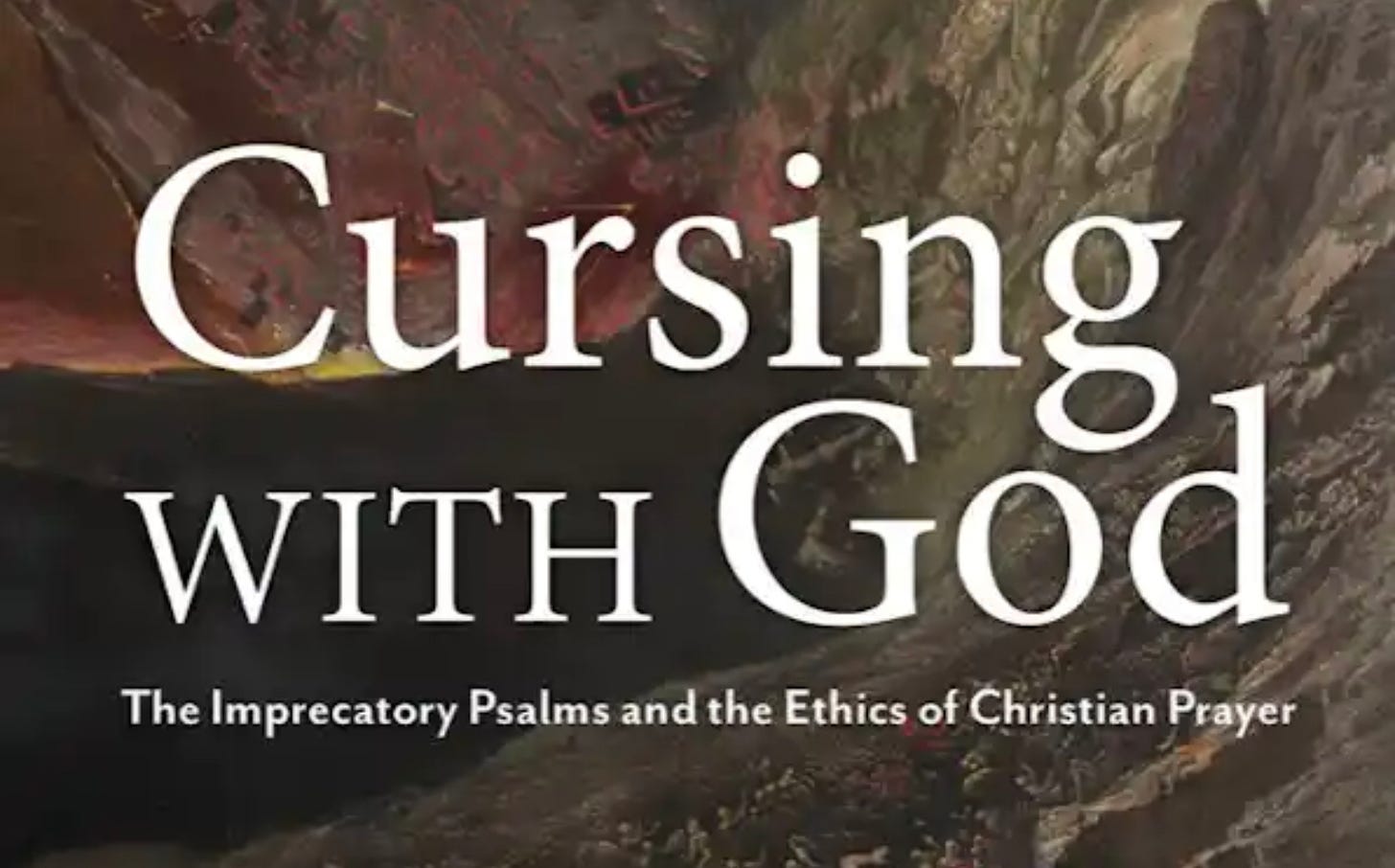Where Are The Imprecators?
I have always felt guilty and a bit morally unclean whenever I feel a sense of satisfaction while reading imprecatory psalms. But in the midst of human betrayal there is an undeniable resonance in my body when I hear the words of, say, Psalm 71:13:
Text within this block will maintain its original spacing when published
May my accusers be put to shame and consumed;
with scorn and disgrace may they be covered
who seek my hurt.
Why is that? Is that a good thing, or evidence of sinful bitterness and anger? Is it true, as C.S. Lewis argued in Reflections on the Psalms, that “the reaction of the Psalmists to injury, though profoundly natural, is profoundly wrong”?
Cursing with God: The Imprecatory Psalms and the Ethics of Christian Prayer by Trevor Laurence helps a great deal with the dissonance most Christians encounter in the cursing psalms. Here is his thesis:
“The psalms of wrath are not merely permissible but indeed a necessary element in the church’s communion with God, prayers that carry an irreplaceable capacity to shape the body of Christ for healing, virtue, and witness in a world gone wrong.” (p. 4)
I am still mulling over his proposal, but it is the healing portion that I am particularly interested in as a counselor and advocate for spiritual abuse survivors. I have wanted to write a reflection on this book for some time now, but this Thesis 96 newsletter is just an introduction to the theme. More to follow in the future. For now, I want to share a poem as an invitation to join me in reflecting on the cursing psalms and their potential place in the process of healing from trauma.
The poem begins and ends with questions because I wrote it before reading Cursing with God. It was prompted by my own comforting and empowering encounters with God in praying psalms of imprecation. I now know that is only a mere beginning of what God intends for his daughters and sons in these uniquely disturbing, disruptive and defiant songs.
(Notes on reading: most rhymes work best pronounced as Im-PREH-ca-TORE, final vowel as in “for” or “door”. Also, I have included Scripture citations for each example of a biblical imprecator, and encourage looking up each passage.)
Where Are The Imprecators?
Text within this block will maintain its original spacing when published
With all their filth and horror, Faithful Abe still prayed down Mercy for Sodom and Gamorrah. (Gen. 18)
We Christians are taught to see in Abe The image of mercy interceding, A shield put to God’s wrathful wave.
But where are the imprecators? Jesus rebuked the Sons of Thunder. Are all Boanerges thus to be abhorred? (Luke 9:54)
But who among us doesn’t know, Doesn’t feel the burning coals which Hunger for hot judgment’s flow?
Paul was an imprecator: No more a murderer, he still feels hurt And believes God holy, Misdeed Repayor. (2 Tim. 4:14)
We Christians are sweet and nice And stumble over imprecating Paul; His ire we judge a vice.
But Paul followed a Jesus who Both wept for lost Jerusalem and Said judgment for Capernaum was due. (Matt. 11:23-24)
Jesus was an imprecator: With a vengeful sinking millstone For the skandalon’s neck in store. (Mark 9:42)
David was an imprecator Who sang down fire into the wicked’s cup, Brimmed with coals overflowing to the floor. (Psalm 11:6)
Asaph was an imprecator Whose chaffing flaming song turned all To dust and ash, oppressors seen no more. (Psalm 83:13-15)
Exiled Judah was an imprecator: Re-tuning Zion’s song to the key Of repaid gloom and doom and blood and gore. (Psalm 137)
Nehemiah was an imprecator: Pleading for turned back taunts and blame Like an angry courtroom counselor. (Neh. 4:4-5)
The martyrs are imprecators: In Heaven yet with prayers red and restive, In wait for wrath on earth’s dwellers. (Rev. 5:9-11)
What are these imprecations for? Where are all the imprecators?
Quote from Trevor Laurence
In the narrative universe of the imprecatory psalms, the imprecator—whether king or community—is presented as the son of God faithfully executing his task to guard (and, at times, extend) the place of God's holy presence by striking the serpent's seed underfoot and driving out the enemy through prayer…The justice psalms may thus be heard as the battle-prayers of a royal priesthood engaged in the Bible's most basic conflict, an element of the son of God's war against the serpent, his seed, and every corrupting unholiness that vitiates the blessedness, sanctity, and consummation of the temple-kingdom of the Lord.”
Recommended Reading
Cursing with God: The Imprecatory Psalms and the Ethics of Christian Prayer by Trevor Laurence.
If you don’t have the time (or money, it’s an expensive book!) for a published PhD dissertation, here’s an article-length treatment of this material: To Serve and Subdue: The Imprecatory Psalms in Biblical Theological Perspective.
Or if you prefer, here is a recent podcast interview:
Question
What’s your first reaction to the imprecatory psalms? How have you encountered them in your own life of prayer and Scripture reading?

